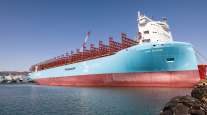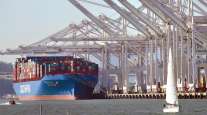Maersk Earnings Fall, Hurt by Weaker Ocean Freight Rates

Danish firm Maersk Group, owner of the largest ocean carrier, earlier this month reported first-quarter earnings plummeted nearly 90% to $224 million, weighed down by an even greater profit decline at Maersk Line due to downward pressure on container freight rates.
Maersk Line eked out a $37 million profit, down from $714 million in the year-earlier period, by reducing costs almost as much as rates declined. Revenue slumped 20% to $4.97 billion. The ocean carrier saw freight rates decline nearly 25% to barely $925 per industry standard 20-foot container unit, or TEU. However, shipments moved increased 7%, to 4.72 million TEUs.
The ocean carrier generated nearly 60% of revenue at the parent company, where revenue dropped to $8.54 billion from $10.55 billion. Maersk’s cargo handling unit, known as APM Terminals, suffered a drop of more than 40% in profit to $108 million, handling about 5% fewer shipments.
The results dramatized the ongoing challenges in the container freight business, which has sparked a series of acquisitions, merger proposals and new service alliances among rivals. While Copenhagen-based Maersk has remained in an alliance with No. 2 carrier Mediterranean Shipping Co., based in Geneva, virtually all of the other top 10 container lines have been moving to secure new partnerships.
Maersk’s earnings report sounded a hopeful note about the market dynamics.
“The industry has recently seen steps towards consolidation from both mergers and acquisition. Over time, this represents a potential ease of the supply situation through more disciplined capacity management,” the statement said.
Analysts such as London-based Drewry still believe industry oversupply and earnings weakness will persist at least through the end of next year due to a continued rise in new ship orders.
“Maersk Line reiterates the expectation of an underlying result significantly below last year [$1.3 billion profit] as a consequence of the significantly lower freight rates going into 2016,” the carrier’s statement said. “Global demand for seaborne container transportation is still expected to increase by 1 to 3%. Maersk Line aims to grow at least with the market to defend its market leading position.”
Maersk moves about 15% of the world’s ocean container freight.




